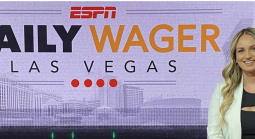The Super Bowl Betting Hypocrisy: A Jenny Woo Special Report

Gambling911.com's Senior International correspondent, Jenny Woo, looks at what we commonly refer to around here as the "Super Bowl betting hypocrisy". It's the concept - employed by the National Football League - that states betting and football simply do not mix. Other major sports leagues have followed the NFL's lead, though not to the same extent.
--
In a Sports Illustrated/Real Sports story reported by Jon Frankel, NBC Sports broadcaster Al Michaels recently talked about the fun he has getting around the NFL taboo that mentions betting lines...and regardless of how the NFL feels, the talk all this week outside of which team will win the 2009 Super Bowl is going to center around what the line was and how much of a payout on the bet. Even CNN is playing it "politically correct" when it comes to any mention of Super Bowl betting. I enjoyed an exchange between anchors Tony Harris and Fredricka Whitfield this past week when Tony (you knew he was a gambler) confessed he had placed a bet on the Super Bowl and Fredricka immediately lashed out jokingly, "you can't say that". While Tony sat there smiling, Fredricka inserted "Okay in Vegas".
Well, the fact is millions of people - maybe even Tony Harris - have placed their bets online, this despite efforts by the NFL to make betting on the Super Bowl and all other games illegal. The National Football League is behind most legislative efforts. They pay big money to lobbyists in Washington to rid the world of online sports betting. The NFL was mentioned in a US Government case against one Jay Cohen, founder of the online sportsbook World Sports Exchange (WSEX.com), still in business today. Cohen served nearly two years in a Federal prison for violating an antiquated "wire act" put in place during the 1960's with the intention of targeting mobsters, for which Cohen - with his master's in nuclear science - is certainly not
In the Real Sports piece, Al Michaels said he doesn't bet on the NFL games "because it's in his contract" and also because he "knows more about the game due to access". But despite this, Michaels seemingly called out the NFL.
"If someone came to the NFL and asked them to co-sponsor a law against gambling, would they do it? Hell no."
While the NFL has its supporters in Congress, they also have people dead set against any online gambling ban in both parties.
Most vocal is among the most visible - a fact not lost on the multi-billion dollar Internet gambling sector, which anticipates taking in a rather large chunk of the Super Bowl betting revenue this weekend.
As Chairman of the House Financial Services Committee, Barney Frank, oversees housing and the banking industries. He believes strongly that recently passed legislation - the Unlawful Internet Gaming Enforcement Act (UIGEA) - places an unnecessary burden on the U.S. financial institutions by requiring them to police transactions they believe are for the purpose of online gambling. Likewise, the prohibition is essentially an unfunded mandate thrust upon a severely ailing banking sector.
The problem: The UIGEA allows for some forms of Internet gambling activity but does not properly define the difference between "good" and "bad" transactions for banks. The watered down law ultimately makes it difficult to open an online gambling account via a credit card, though no impossible. Nothing in the measure stipulates it is illegal for an individual living in the United States to place a wager.
And the NFL's thumbprints were all over the new law. The UIGEA incorporated a very special "carve out" provision for fantasy sports.
I had a chance to sit down with Congressman Frank who himself questioned the hypocrisy when it comes to gambling and the law, not to mention how religion plays into the whole agenda.
"Well, some (in Congress) have a religious view about it (gambling), which puzzled me because the problem is - Is there something in the Bible that says gambling is a terrible thing...except Bingo?"
Barney Frank is far from the only politician looking to overturn measures that have only served to make the legality of online gambling more of a grey area.
Republican Ron Paul, who ran for U.S. President and actually beat the GOP nominee, John McCain, in a few of the earlier primaries, is also dead set against outlawing online gambling.
"Mine is a philosophic position but I think it's a sound position," Congressman Paul told Gambling911.com "I think it's something that you can defend as being a strict constitutionalist and I just don't see government being the moralist deciding how we spend our time whether is good or bad. I have a strong belief that the individual gets to make that choice so the fact that I don't gamble doesn't really influence me in my positions on this issue."
Along with political allies, the online gambling, poker and sports betting sector now has its own trade organization to represent their interests in a U.S. court of law.
The Interactive Media Entertainment & Gaming Association (known in the industry as simply iMEGA.org) is looking to have the UIGEA policy enforcement overturned on the grounds that the law is "unconstitutional". They will have their day in court come April as the United States Third Circuit Court of Appeals has asked both sides, iMEGA and the United States Government (the defendants) to present their oral arguments.
"We're very happy the Court is moving forward to schedule oral arguments," said Joe Brennan, Jr., iMEGA chairman. "We're confident we have a strong suit, and it will be difficult for the Department of Justice to defend UIGEA, because it is fatally flawed."
Brennan, Jr. believes the prohibition is looking even more flawed now that the Supreme Court announced two weeks ago it would not review a decision by the U.S. Court of Appeals in Philadelphia (the same court where iMEGA vs. U.S. Government is being heard) invalidating the Child Online Protection Act.
"Again, the 3rd Circuit has shown why it may be the most important Court in the country when considering Internet rights and "digital civil liberties," Brennan, Jr. told Gambling911.com.
Brennan, Jr., a father of two young children himself, insists attempts to have COPA shoved down the throats of Americans has little to do with child welfare and everything to do with restricting Internet access. In its ruling, the Federal Appeals Court said that COPA violates the First Amendment because filtering technologies and other parental control tools offer a less restrictive way to protect children from inappropriate content online.
Ironically, it was Brennan, Jr. and the efforts of iMEGA's legal counsel (with the support of powerful members), who fought and indirectly beat the powerful horse racing industry just two weeks ago.
Horse racing and gambling make no secret of their perfect marriage, unlike the NFL and gambling. But the commonwealth of Kentucky through its industrious Governor, Steven Beshear, determined online gambling to be the "third wheel" in this relationship.
"Online gambling sites are leeches on our communities and undermine Kentucky's horse racing industry," a defiant Beshear lashed out last September before attempting to have 141 such online gambling domains seized.
He almost succeeded if not for the efforts of The Interactive Media Entertainment & Gaming Association. Beshear won his case in a Franklin County Circuit Court but the decision was later overturned on appeal filed by iMEGA.
Like the Super Bowl, the Kentucky Derby is among the most bet on single day sporting events. In fact, the two ran neck and neck last year in terms of Web inquiries by gamblers.
The Interactive Media Entertainment & Gaming Association fought at the state level and won. Whether Churchill Downs and the powers-that-be at the Kentucky Derby had any influence over Beshear's decision to go after online gambling matters little as the Governor threw them into the fray.
Oral arguments in the United States Third Circuit Court of Appeals will be observed carefully by the National Football League come April. This one is on their playing field. Whether they choose to admit it or not, the NFL has invested substantial amounts of time and financial support at the federal level in trying to prevent U.S. citizens from betting online. It is a fair assessment to make that as much as half the Super Bowl audience would be lost if people weren't betting on this game. This rings even more true if it happens to be a lopsided affair.
Jenny Woo, Gambling911.com International Senior Correspondent













